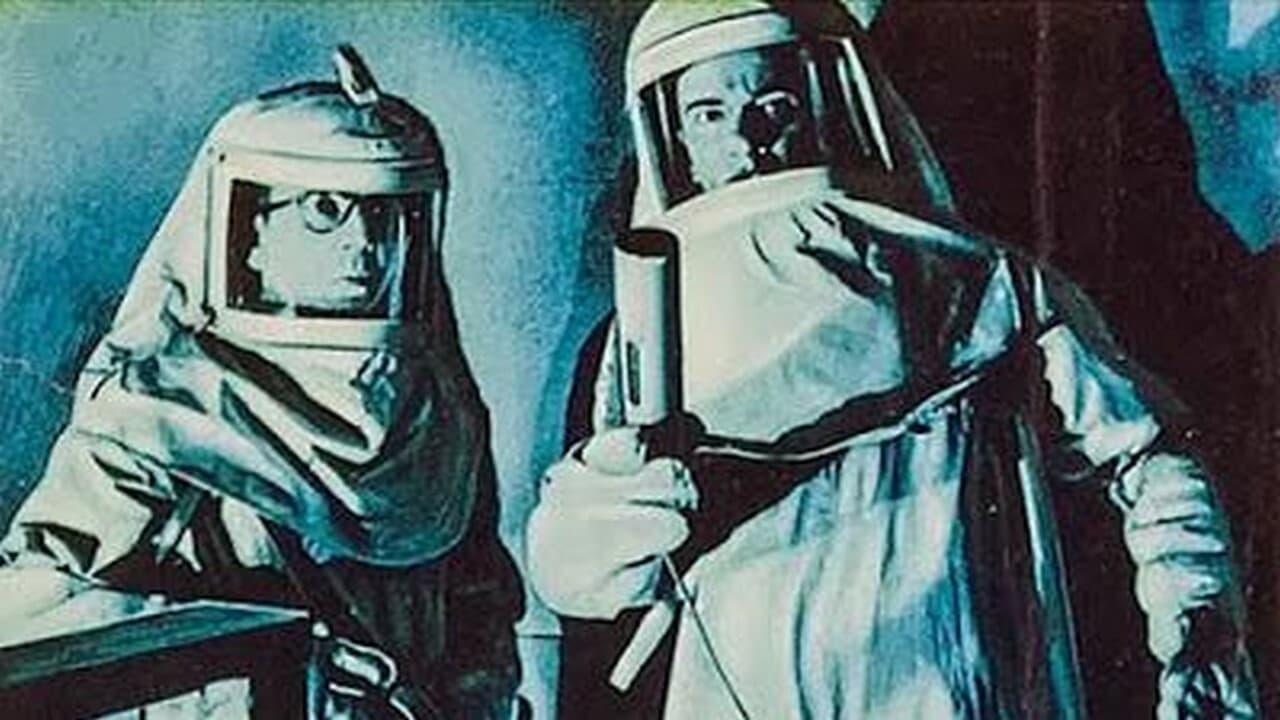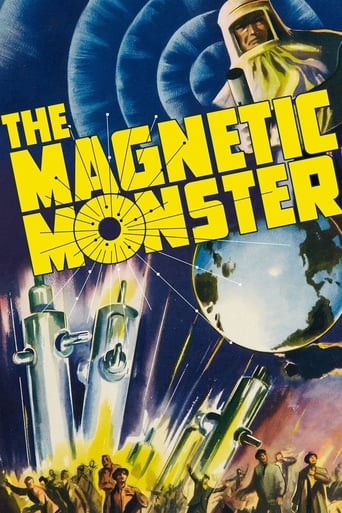

Purportedly a 'hard' science fiction film, "The Magnetic Monster" (1953), presents little 'science' and even less 'fiction', as the film is mostly voice-over exposition and stock footage. The story starts intriguingly: pockets of inexplicable magnetism appearing that a special team of scientist-detectives (the OSI) are brought in to investigate. The story then slides downhill into endless pseudo-scientific chatter about magnetic monopoles and new elements. As it turns out (spoilers hereafter), the 'monster' is an element capable of direct conversion of energy to mass that will, if allowed to continuously 'feed', consume the planet. The answer, of course, is to overfeed it until it explodes, which necessitates a trip to Nova Scotia (of all places) where it can be exposed to some borrowed footage of a BDO from a pre-WW2 German science fiction film. Superimposed on the monster-hunt is a tedious and unnecessary 'relationship drama' concerning the lead investigator and his pregnant wife. What I disliked the most about this film was its inability to be true to its 'hard science' premise: the replicating element could have been treated as a completely lifeless yet existential threat (perhaps like the crystals in the "The Monolith Monsters" (1957)) but instead, in keeping with the misleading title, the script was full of silly anthropomorphising with references to the element being "hungry" or that it will "reach out its magnetic arm". This kind of dialogue just seemed ridiculous coming from the ostensibly hard-boiled scientists investigating the phenomena. Overall, neither clever enough to be interesting nor silly enough to be entertaining, IMO "The Magnetic Monster" is not worth the time spent watching by anyone other than hard-core fans of the genre.
... View MoreThis is very good 1950's science fiction. At the center is Curt Siodmak, a pretty good writer who involves us in a tale where the use of a particle accelerator causes magnetism to go crazy. It results in implosions that could eventually end all life on earth. It's up to Richard Carlson and King Donovan, staples in the movie genre of the time, to come up with a solution. This is post atom bomb time and we are treated to a lot of moralizing about life and its preciousness. This could have gotten out of hand but is reined in pretty well. I thought the science was reasonable and the acting quite good. Stereotyping was kept to a minimum and allowed the principles to do their thing. Very good scene in an appliance store at the beginning.
... View MoreA routine but kind of amusing entry in the science-fiction series of the early 1950s. I missed the first half hour or so, so I'm filling it in from sequelae of the early events.Some ancient experimental physicist invents a new element with lethal powers. Like the man-eating plant in "The Little Shop of Horrors," it must be fed a certain amount of energy on a regular schedule, or it turns magnetic, attracts every metal in sight, and destroys life. So far, so good. Only the thing, which started off as hardly more than a pinpoint of matter, gets bigger with every meal. Soon it will be so big and so dense, it will throw the earth out of orbit and you know what happens next.And, man, this element is heavy. The movie is loaded with all kinds of scientific jargon. Most of it got by me. But I did catch the fact that the molecular weight of this thing is somewhere above one thousand. This brought me to instant alert, Darwinian points quivering. A cloud of half-remembered concepts drifted back into my ken from high school -- molar mass, molecular weight, Avogadro's number, isotopes -- but somewhere along the way they'd lost much of their semantic luggage. I think I can feel a molar mass right now with the tip of my tongue. It's right back there, see? It's been bothering me for a week, doctor.Anyway, I get the impression that this thing is pretty "heavy". There is also a suggestion that when the original physicist discovered this element, he pulled off a kind of slow-motion replica of the Big Bang, the instant when the universe was created out of nothing. The result of the Big Bang was a couple of "forces" like gravity and a horde of hydrogen atoms. That's okay, as far as it goes. But if the universe is everything that now exists, and if it's expanding, what the hell is it expanding INTO? Well, never mind that. The attempt to stop this thing from growing becomes frantic, along the lines of "The Andromeda Strain." The only way to stop it is to bombard it with more electrical energy than it can possibly absorb, so it chokes to death. The computer arrives at a minimum of 900,000,000 volts, which is an awful high figure. I mean, your brain only generates a measurable 10 microvolts. Well, that's about the average; I can't speak for any particular brain.The US has no such generator but Canada does, buried beneath the ocean depths in Nova Scotia. Canada reluctantly agrees to its use. The underground control room is about the size of a large living room and is filled with curious knobs, buttons, levers, and winches. Richard Carlson and his buddy, King Donovan, place the entirety of the dangerous mass in the death chamber and begin activating the Super Duper Generator. Does the plan work? Well, we're still here, aren't we?
... View MoreMagnetic Monster, The (1953) * 1/2 (out of 4) Far-fetched sci-fi has a wacky scientist coming up with an artificial radioactive material that takes up so much energy around it that it could possibly knock the entire planet Earth off its axis. Richard Carlson plays the doctor preparing for his first child but first he must try and find a way to destroy the isotope before the world comes to an end. During the 1950s there's no doubt that people were paranoid over various science experiments that could possibly go wrong and destroy the world and this here led to producers coming up with all sorts of stories to try and get on the big screen. I've seen dozens of such science fiction movies and this one here is without question one of the most frustrating to watch. It doesn't help that we get some pretty bland narration that tries to explain what's going on but there were several times where the story just goes off into directions where you can't help become confused. There are scenes that appear to be happening for no apparent reason and the eventual twist that happens towards the end just isn't all that believable. I think it was a pretty dangerous thing to have a "monster" that really isn't a monster at all. After all, people were expecting giant lizards, giant ants or some sort of radioactive creature but instead this film just delivers a magnetic force. This "force" isn't the greatest killer out there but I give the film credit for trying something different but the problem is that the screenplay wants to go for childish matinée thrills that the "brains" that the story might hold are never allowed to grow or develop into something more interesting. Carlson is a fan favorite and he delivers a fine performance here as do the supporting players including King Donovan, Harry Ellerbe and Jean Bryon as the wife. The finale contains some amazing special effects but THE MAGNETIC MONSTER can't really take credit for them since they were lifted from the 1934 German film GOLD and one can't help but want to track it down after seeing the work edited into this picture.
... View More